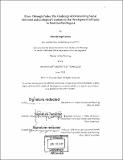| dc.contributor.advisor | J. Phillip Thompson. | en_US |
| dc.contributor.author | Angel Lalinde, Marcela | en_US |
| dc.contributor.other | Massachusetts Institute of Technology. Department of Urban Studies and Planning. | en_US |
| dc.coverage.spatial | e-ci--- | en_US |
| dc.date.accessioned | 2018-09-17T15:56:05Z | |
| dc.date.available | 2018-09-17T15:56:05Z | |
| dc.date.copyright | 2018 | en_US |
| dc.date.issued | 2018 | en_US |
| dc.identifier.uri | http://hdl.handle.net/1721.1/118068 | |
| dc.description | Thesis: M.C.P., Massachusetts Institute of Technology, Department of Urban Studies and Planning, 2018. | en_US |
| dc.description | Cataloged from PDF version of thesis. | en_US |
| dc.description | Includes bibliographical references (pages 67-71). | en_US |
| dc.description.abstract | In the development of parks in Bogota, legacies of conflict pull the environmental and post-conflict equity-building agendas apart. This thesis interrogates the relationship between post-conflict, equity-building and the ecology of public parks in order to propose a framework for the development of green open spaces that advances both agendas simultaneously, through everyday city-making processes. In particular, using a case study of Bogotá's park system, this research explores the challenges when maximizing the benefits of ecological services, while fostering spatial equity, social cohesion, and civic formation in the development of parks in post-conflict contexts. This thesis employs an inductive research methodology that combines qualitative methods with spatial analysis and case study inquiries to identify key assumptions obscured in the everyday city-making processes. This reveals a phenomenon observable in the development of parks in Bogotá, whereby forces of social exclusion and fear of the other, in combination with ideas of order and security, end up provoking a simultaneous restraint on biodiversity and human diversity. This thesis explores the position of the different actors-both mainstream players and alternative organizations-involved in the design, planning, and operation of parks in Bogotá, and reveals how decision-making tools reinforce their theoretical positions. By doing so, it uncovers competing frameworks and priorities at play in a fragmented institutional context. A selection of exemplary parks, illustrate where legacies of conflict (such as associating nature with crime, and expressing nervousness towards "the other") still over-determine the ways in which parks are designed, programmed, and maintained. These environmental tensions are mostly present in the development of large parks in ecologically vulnerable areas, and are generated by rigid assumptions that treat ecological functionality and security as mutually exclusive. Simultaneously, small neighborhood parks face class-based social frictions that reflect differences between neighborhood-centric preferences and the function of parks as city services for all, and a trend for increased agency of neighborhood associations threaten to make parks less inclusive. Nevertheless, alternative practices are emerging in the development of natural recreational settings that are promoting ecological conservation, high-use, and civic formation. By identifying opportunities, promoting collaboration, and seeking new processes and decision-making tools, this thesis offers a set of planning strategies and an implementation framework of social inclusion and ecological biodiversity to overcome fear (or perception of fear) and reinforce the potential of parks as peace-building tools. | en_US |
| dc.description.statementofresponsibility | by Marcela Angel Lalinde. | en_US |
| dc.format.extent | 71 pages | en_US |
| dc.language.iso | eng | en_US |
| dc.publisher | Massachusetts Institute of Technology | en_US |
| dc.rights | MIT theses are protected by copyright. They may be viewed, downloaded, or printed from this source but further reproduction or distribution in any format is prohibited without written permission. | en_US |
| dc.rights.uri | http://dspace.mit.edu/handle/1721.1/7582 | en_US |
| dc.subject | Urban Studies and Planning. | en_US |
| dc.title | Peace through parks : the challenge of overcoming social frictions and ecological tensions in the development of parks in post-conflict Bogotá | en_US |
| dc.type | Thesis | en_US |
| dc.description.degree | M.C.P. | en_US |
| dc.contributor.department | Massachusetts Institute of Technology. Department of Urban Studies and Planning | |
| dc.identifier.oclc | 1051770490 | en_US |
